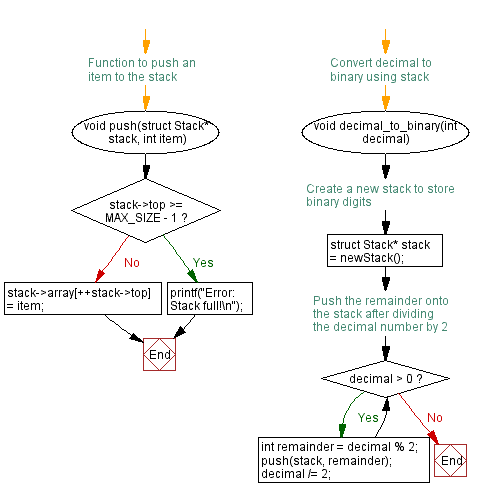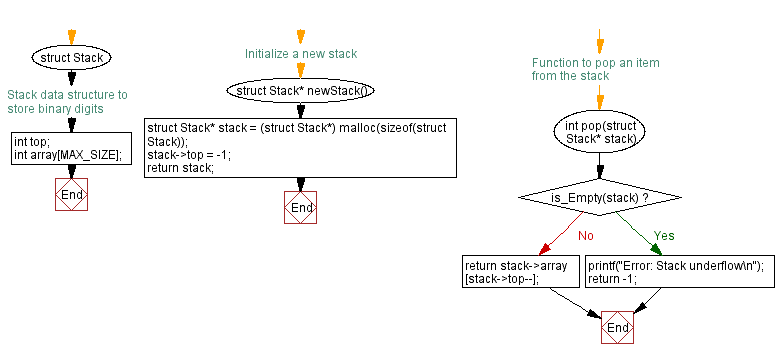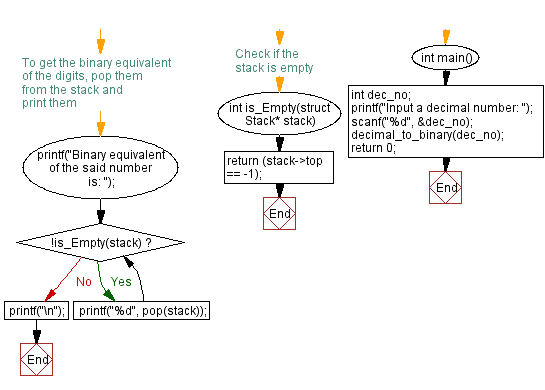C Exercises: Decimal number to its binary equivalent using stack
17. Base Conversion Using Stack
Write a C program to convert a decimal number to its binary equivalent using stack.
Sample Solution:
C Code:
#include <stdio.h>
#include <stdlib.h>
#define MAX_SIZE 100
// Stack data structure to store binary digits
struct Stack {
int top; // Index for the top of the stack
int array[MAX_SIZE]; // Array to hold elements of the stack
};
// Initialize a new stack
struct Stack* newStack() {
struct Stack* stack = (struct Stack*) malloc(sizeof(struct Stack)); // Allocate memory for the stack
stack->top = -1; // Set the top index to -1 (empty stack)
return stack;
}
// Check if the stack is empty
int is_Empty(struct Stack* stack) {
return (stack->top == -1); // Returns 1 if the stack is empty, otherwise 0
}
// Function to push an item to the stack
void push(struct Stack* stack, int item) {
if (stack->top >= MAX_SIZE - 1) {
printf("Error: Stack full!\n"); // Display an error message if the stack is full
return;
}
stack->array[++stack->top] = item; // Increment top index and add the item to the stack
}
// Function to pop an item from the stack
int pop(struct Stack* stack) {
if (is_Empty(stack)) {
printf("Error: Stack underflow\n"); // Display an error message if the stack is empty
return -1;
}
return stack->array[stack->top--]; // Return the top element and decrement top index
}
// Convert decimal to binary using stack
void decimal_to_binary(int decimal) {
// Create a new stack to store binary digits
struct Stack* stack = newStack();
// Push the remainder onto the stack after dividing the decimal number by 2
while (decimal > 0) {
int remainder = decimal % 2; // Get the remainder when divided by 2
push(stack, remainder); // Push the remainder onto the stack
decimal /= 2; // Update the decimal number
}
// To get the binary equivalent of the digits, pop them from the stack and print them
printf("Binary equivalent of the said number is: ");
while (!is_Empty(stack)) {
printf("%d", pop(stack)); // Print the binary equivalent by popping elements from the stack
}
printf("\n");
}
int main() {
int dec_no;
printf("Input a decimal number: ");
scanf("%d", &dec_no); // Read a decimal number from the user
decimal_to_binary(dec_no); // Convert the decimal number to binary
return 0;
}
Output:
Input a decimal number: 10 The binary equivalent is: 1010 Input a decimal number: 109 Binary equivalent of the said number is: 1101101 Input a decimal number: 2015 Binary equivalent of the said number is: 11111011111
Flowchart:



For more Practice: Solve these Related Problems:
- Write a C program to convert a decimal number to its hexadecimal equivalent using a stack.
- Write a C program to convert a decimal number to its octal equivalent using a stack.
- Write a C program to perform arbitrary base conversion (from any base to any base) using stack operations.
- Write a C program to convert a fractional decimal number to its binary representation using a stack.
Go to:
PREV : Kth Element Retrieval in Stack.
NEXT : C Programming Binary Heap Exercises Home.
C Programming Code Editor:
Have another way to solve this solution? Contribute your code (and comments) through Disqus.
What is the difficulty level of this exercise?
Test your Programming skills with w3resource's quiz.
